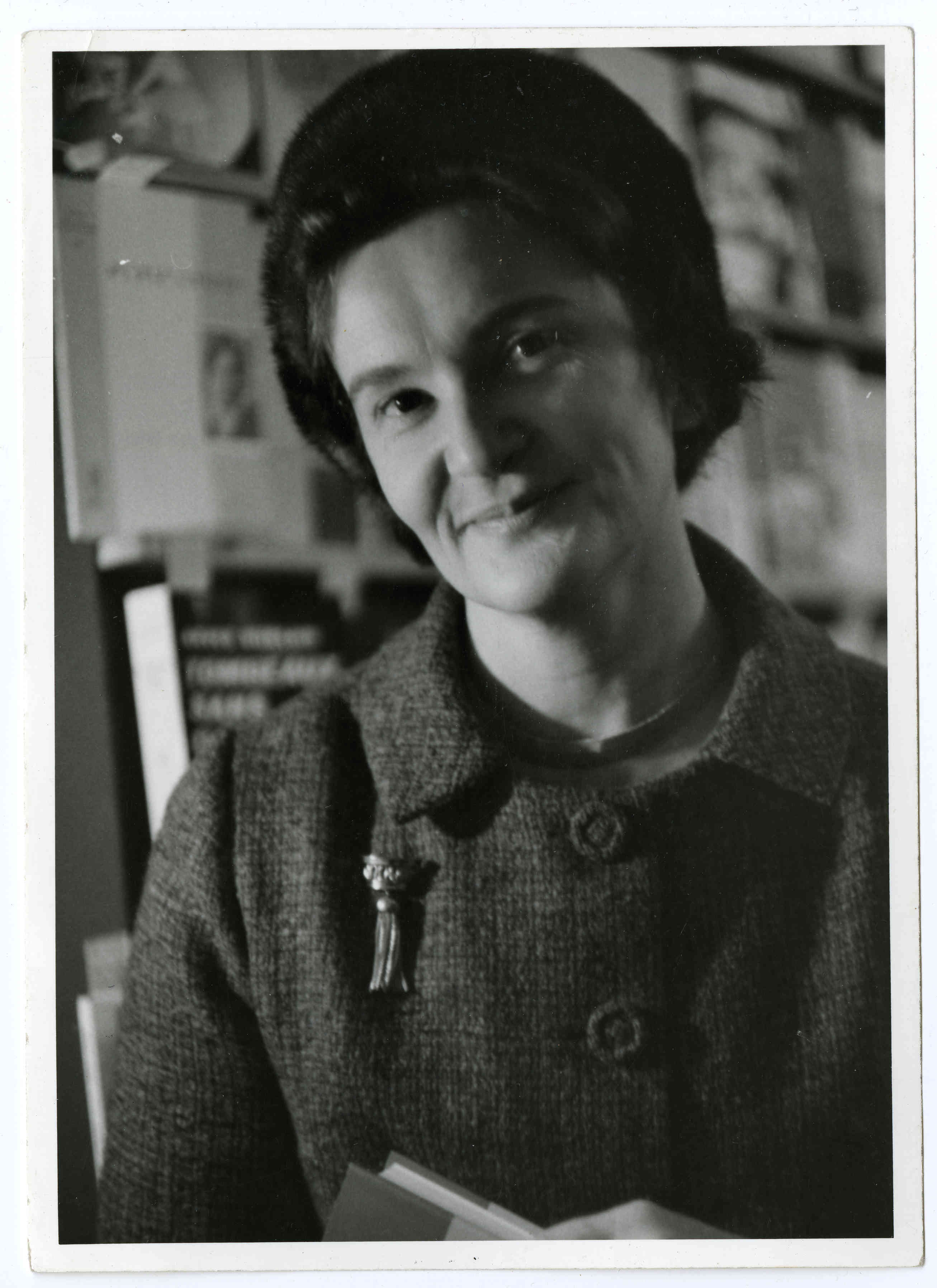
Karin Saarsen
Karin Saarsen (in marriage Karlstedt, 31. XII 1926 – 25. I 2018) was an Estonian writer and journalist, who lived in Sweden and was known for her poetry and prose.
Saarsen was born in Tartu, her father was the Estonian colonel Villem Saarsen and her mother was Polish. She studied at Elva primary school but due to the mobile nature of her father’s occupation, also at Riga and at Tallinn French Lyceum. When the family escaped from Soviet occupation to Germany in 1940, Saarsen started attending Berlin Girls’ School. She finished her studies in Tallinn Westholm Gymnasium in 1944. The family fled to Germany for the second time that year and lived at refugee camps until 1947. After relocating to London, Saarsen worked at the editorial board of the newspaper Eesti Hääl and as a secretary and translator, while studying journalism. From autumn 1949 until her passing, she lived in Sweden. She studied philology and pedagogy at Stockholm University, which she graduated in 1970 with a master’s degree. She mostly worked as a journalist but also contributed to other international news agencies and foreign Estonian newspapers. She also worked at the Estonian service of Radio Free Europe. She was a member of the collegiate body of the Estonian National Congress in Sweden and the chairwoman of the Stockholm department of the Estonian Writers’ Union Abroad. As a theater enthusiast, she also wrote a few plays and the study Eesriie tõusis siiski. Lensi Römmer-Kuus ja eesti pagulasteater Rootsis 1945–1987 (‘The Curtain Still Rose. Lensi Römmer-Kuus and Estonian Exile Theater in Sweden, 1945-1987’, 2000).
Her first poems were published in the 1947 Christmas edition of the newspaper Eesti Hääl. She made her debut in Sweden in 1961 with her poetry collection Sisalik kivil (‘Lizard on a Rock’), which was followed by five more collections. The last of these was Lõvi ja orhidee (‘The Lion and the Orchid’, 2002), which was published in Estonia and contained poetry in Swedish, English, German and French. Her early poetry is dominated by politically charged verse, which express the feelings of losing one’s homeland. Her poetry has themes of disappointment in civilization, but also fear for personal happiness and the collapse of society. Love poetry takes center place in Saarsen’s work and offers the reader a complete emotional journey from romantic awakening and first feelings to boldly erotic experience of happiness and finishes with deeply felt feelings of grief and loneliness. Saarsen’s traditional form poetry is impactful due to its spontaneous experience and sensuality, due to which it has been compared to the verses of Marie Under. The collection Ühest õnnelikust õnnetust armastusest (‘Of One Happy Unhappy Love’, 1968) is full of passion and personal happiness. A more demanding kind of figurative poetry can be found in the poetry collection Lohengrini lahkumine (‘The Departure of Lohengrin’, 1972), which is in form a symbolic long poem.
Saarsen has published two prose books. The collection Vallutajad (‘Conquerors’, 1967) consists of 14 short stories. The emotionally intense collection has many stories (e.g. ‘Ultimate Happiness’ and ‘Pride’) that focus on war anxiety and fears, which the characters alleviate with erotic urges and liberal morals. Saarsen places equal emotional weight on erotica and war, sex and political violence, thus demonstrating how political ideologies blur in the deep state of human urges. The military science fiction stories that are set in imaginary places (e.g. ‘Conquerors’ and ‘Glass Doors’) warn against total or nuclear war, the depictions of which often swell into apocalyptic. The dozen short story like chapters form the memoir novel Poola suvi. Ühe eesti-poola suguvõsa elupeegeldusi (‘Polish Summer. Life Reflections of an Estonian-Polish Family’, 1993), in which the author emphatically explores the memories and legends of her mother’s Polish family, thus coming to a more complicated and vivid understanding of her own identity. The culturally and genealogically valuable true story novel contains many photos and is one of the most remarkable achievements of Estonian childhood memoirs.
A. O. (Translated by A. S.)
Books in Estonian
Poems
Sisalik kivil. Stockholm: 1961, 52 lk.
Rippuval sillal. Teine kogu luuletusi. Stockholm: EMP, 1964, 76 lk.
Ühest õnnelikust õnnetust armastusest. Kolmas kogu luuletusi 1965–1968. Stockholm: EMP, 1968, 81 lk.
Lohengrini lahkumine. Neljas kogu luulet 1970–1972. Stockholm: EMP, 1972, 76 lk.
Üksilduse aastaajad. Viies kogu luuletusi. Lund: Eesti Kirjanike Kooperatiiv, 1977, 79 lk.
Lõvi ja orhidee. Kuues kogu luulet. Tallinn. Eesti Raamat, 2002, 126 lk. [Mitmekeelne luulekogu eesti, rootsi, inglise, saksa ja prantsuse keeles.]
Prose
Vallutajad. Stockholm: EMP, 1967, 304 lk. [Jutud.]
Poola suvi. Ühe eesti-poola suguvõsa elupeegeldusi. Tõsieluromaan. Tallinn: Eesti Raamat, 1993 teose tiitellehel vääralt 1991), 207 lk. [2. trükk: Tallinn: SE & JS, 2006, 208 lk.]
Non-fiction
Eesriie tõusis siiski. Lensi Römmer-Kuus ja Eesti pagulasteater Rootsis 1945–1987. Tallinn: Faatum, 2000, 279 lk.



